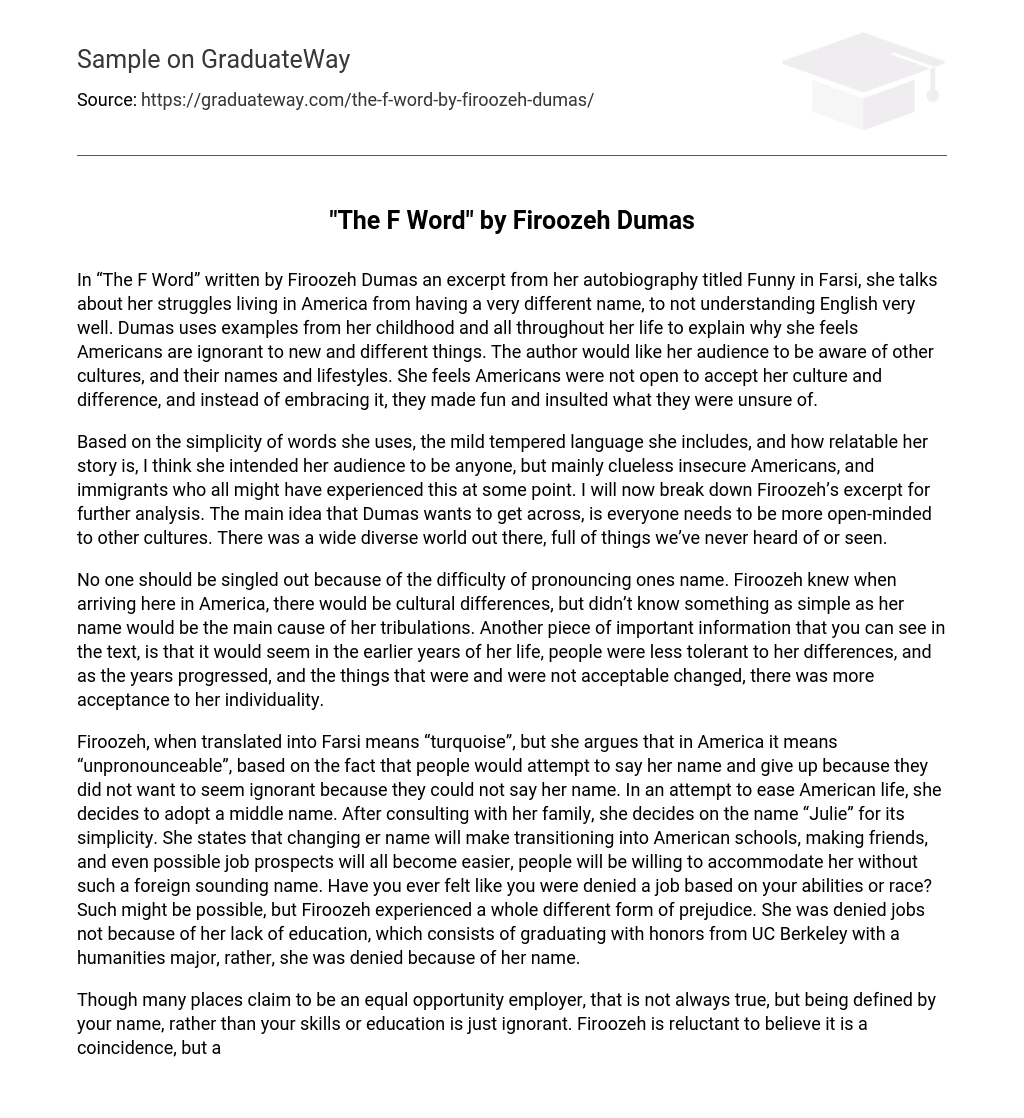In “The F Word” written by Firoozeh Dumas an excerpt from her autobiography titled Funny in Farsi, she talks about her struggles living in America from having a very different name, to not understanding English very well. Dumas uses examples from her childhood and all throughout her life to explain why she feels Americans are ignorant to new and different things. The author would like her audience to be aware of other cultures, and their names and lifestyles. She feels Americans were not open to accept her culture and difference, and instead of embracing it, they made fun and insulted what they were unsure of.
Based on the simplicity of words she uses, the mild tempered language she includes, and how relatable her story is, I think she intended her audience to be anyone, but mainly clueless insecure Americans, and immigrants who all might have experienced this at some point. I will now break down Firoozeh’s excerpt for further analysis. The main idea that Dumas wants to get across, is everyone needs to be more open-minded to other cultures. There was a wide diverse world out there, full of things we’ve never heard of or seen.
No one should be singled out because of the difficulty of pronouncing ones name. Firoozeh knew when arriving here in America, there would be cultural differences, but didn’t know something as simple as her name would be the main cause of her tribulations. Another piece of important information that you can see in the text, is that it would seem in the earlier years of her life, people were less tolerant to her differences, and as the years progressed, and the things that were and were not acceptable changed, there was more acceptance to her individuality.
Firoozeh, when translated into Farsi means “turquoise”, but she argues that in America it means “unpronounceable”, based on the fact that people would attempt to say her name and give up because they did not want to seem ignorant because they could not say her name. In an attempt to ease American life, she decides to adopt a middle name. After consulting with her family, she decides on the name “Julie” for its simplicity. She states that changing er name will make transitioning into American schools, making friends, and even possible job prospects will all become easier, people will be willing to accommodate her without such a foreign sounding name. Have you ever felt like you were denied a job based on your abilities or race? Such might be possible, but Firoozeh experienced a whole different form of prejudice. She was denied jobs not because of her lack of education, which consists of graduating with honors from UC Berkeley with a humanities major, rather, she was denied because of her name.
Though many places claim to be an equal opportunity employer, that is not always true, but being defined by your name, rather than your skills or education is just ignorant. Firoozeh is reluctant to believe it is a coincidence, but as soon as she began filling out applications with her “American” name, Julie, all of a sudden she began to receive a flood of job offers. That was more than coincidence, that was discrimination. When Firoozeh Dumas, who at the time of moving here, had her maiden name which she left unknown, she was taunted by other school children because of her hard to pronounce name.
She failed to mention the twists people made of her name, unlike the amusing nicknames her cousins and brothers received. After coming up with her much more Americanized name of Julie, she was no longer an outsider. All of a sudden, students began to remember her name, because of its simplicity, she made more friends, her life all together, became much simpler; however, trouble did pursue, with her new name, and lack of an accent, she was mistook for being anything other than Iranian, and was involved in many controversial discussions over the Iranian Revolution.
Being more accepted allowed her to see the darker side of many people, the hatred they harbor. She was not letting them into her world, they were letting her into theirs. In this day and age, graduating from college does not always guarantee a job. But around the time she graduated college, somewhere in the 1980s, graduating college would have been a much bigger deal, especially graduating from UC Berkeley. Even with her high level of education, Firoozeh Dumas was encountering difficulties obtaining a job, which obviously was not caused by er education. The fact that she was overlooked because of her name may sound outrageous, but the farther back in time you go, the less accepting everyone was to change or anything different. As soon as she began using her American name for her jobs, offers began rolling in, surely using a different name can’t possibly mean that Julie is a better candidate then Firoozeh, can it? In an online internet source (http://firoozehdumas. com/about-firoozeh-dumas/), it states that Firoozehs book was intended as a gift for her children.
Based upon this, and her cynical sense of humor, vocabulary and themes, this leads to believe that this book was meant for older children, perhaps 10 and up. There are vague references to death and punishment, which obviously is not intended for younger children. Bringing this to an end, as long as people learn to be more open minded and accepting to other cultures and languages then Firoozeh Dumas’ writings were not in vain. She wanted only to inform everyone of her story, and describe the prejudices she faced while being “ Funny in Farsi”





